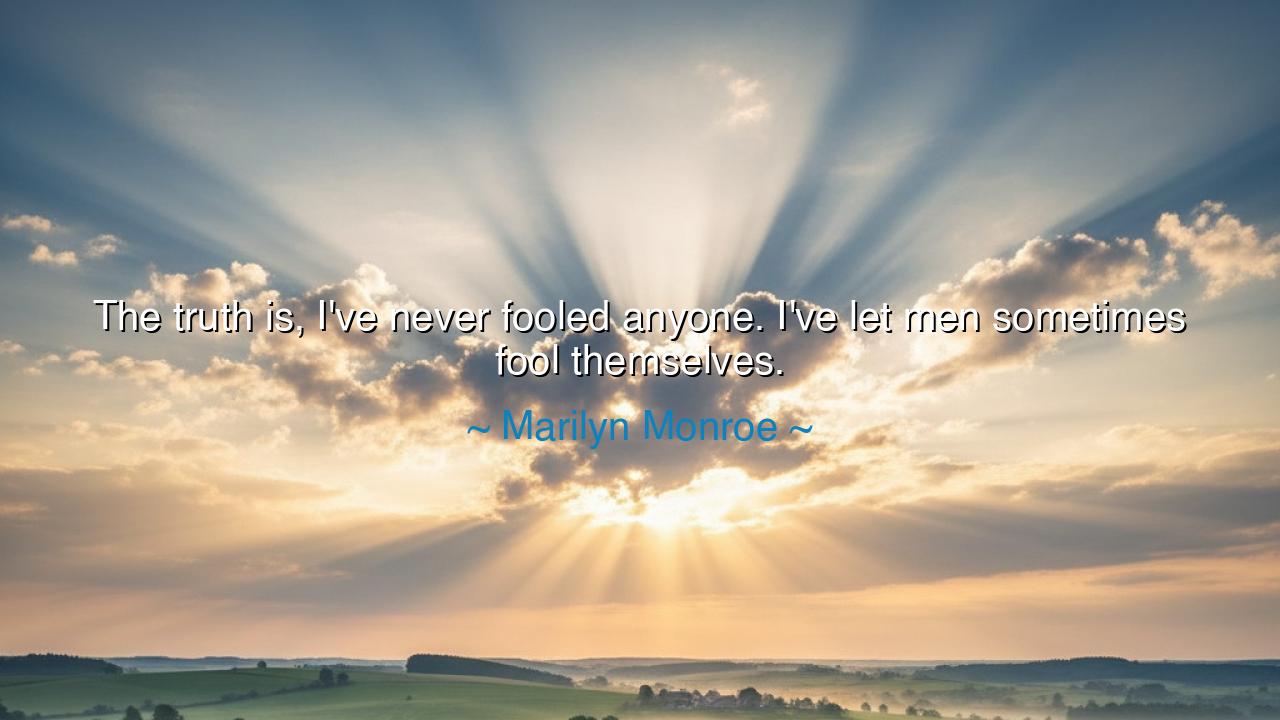
The truth is, I've never fooled anyone. I've let men sometimes






In the vast arena of life, where the light of truth often flickers beneath the shadows of illusion, there is a profound wisdom in Marilyn Monroe’s words: “The truth is, I've never fooled anyone. I've let men sometimes fool themselves.” These words speak to a deeper understanding of authenticity and perception, revealing how the world is often deceived not by the lies we tell, but by the truths we allow others to believe. Monroe, a woman who captivated the world with her beauty and vulnerability, understood that people often do not wish to see the truth. Instead, they create illusions around themselves, projections that they are more comfortable with, even if those projections are far from reality.
The ancients also spoke of the illusion of appearances. In the great dialogues of Plato, he tells the story of the Allegory of the Cave, where prisoners are chained and can only see shadows on the wall, believing these shadows to be the whole of reality. In the same way, Monroe recognized that many people, in their desire to project power, beauty, or perfection, were caught in their own cave—they only saw the shadows of their own desires, not the truth that lay beyond. She, in a sense, was like the philosopher who stepped outside the cave, aware of the deeper layers of reality, yet choosing not to force others to see the truth, knowing that many would rather remain in their comforting illusions.
This theme of illusion and self-deception echoes through the lives of many great figures. Take, for instance, the tale of Oedipus, the tragic king of ancient Thebes. Oedipus spent much of his life trying to outrun a prophecy that foretold he would kill his father and marry his mother. In his attempt to avoid his fate, he stumbled directly into it, blind to the truth that lay before him. Oedipus’s downfall is not caused by the truth itself, but by his refusal to acknowledge it when it was right in front of him. Monroe, too, understood that truth can be a painful force, one that many would rather not confront. She, like Oedipus, recognized the human tendency to hide from truth, but instead of exposing the illusion with force, she allowed people to fool themselves, to remain in their comfortable version of reality.
Monroe’s wisdom also reflects a deeper understanding of human nature. It is easier, at times, to let others deceive themselves than to engage in the difficult work of unveiling uncomfortable truths. The ancients understood this, too. The Stoics, for example, often spoke of the power of self-awareness and self-deception. Epictetus, a Stoic philosopher, taught that the only true freedom comes from knowing oneself, from seeing clearly without the filter of illusions. Yet, the Stoics also understood that the world is full of foolishness—people will always seek to convince themselves of things that make them feel better, safer, or more in control. In allowing others to fool themselves, Monroe was playing into this ancient understanding: truth can be a gift, but sometimes, it is a gift that must be offered carefully, for it can be overwhelming.
Consider the way Monroe portrayed herself to the world—often the image of glamour, the epitome of feminine allure. Yet, beneath that image was a woman deeply aware of her own vulnerability, her struggles with identity, and her relationship with an often indifferent world. The world saw what it wanted to see—a perfect movie star, a symbol of beauty and desire—but Monroe never fully fit into that mold. In a way, she allowed the world to see her as they wanted, knowing that the truth of her internal world was far more complex, and perhaps too difficult for others to understand. This aligns with the ancient concept of the mask, the persona that one wears to navigate the world, while the deeper self remains hidden, sometimes even from the wearer.
Yet Monroe’s decision to let others fool themselves was not an act of dishonesty, but one of acceptance. She recognized that truth, especially in its rawest form, can be too much for many to bear. To live among others, to coexist in society, often requires a balancing act—the need to interact with the world as it is, while maintaining an inner authenticity that may not always align with the expectations of others. In this, Monroe mirrors the wisdom of the Taoist sages, who spoke of wu wei, the art of effortless action, the power of allowing things to flow naturally without forcing or controlling them. Monroe allowed people to see only what they were ready to see, trusting in the natural course of life and the inevitable unfolding of truth when it was ready to emerge.
The lesson of Monroe’s words is one of understanding—understanding the difference between truth and illusion, between what others wish to see and what is truly present. It reminds us that while we should always seek to be authentic in our own lives, we must also recognize that others may not yet be prepared for the full truth. Sometimes, the best way to honor the truth is to allow others the space to discover it on their own, to let them unveil their own illusions when they are ready. We must learn to be compassionate with others, and with ourselves, knowing that truth can be a gift—but only when it is given with wisdom and care. In the end, we are all on a journey of awakening, and the path is often clearer when we walk it in our own time.






AAdministratorAdministrator
Welcome, honored guests. Please leave a comment, we will respond soon